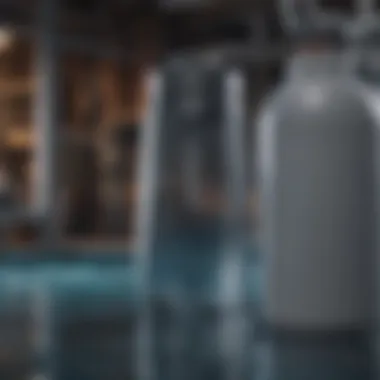Discovering the Latest Breakthroughs in Water Softener Technology


Well-Being Overview
Water softener technology plays a crucial role in improving the quality of water in our daily lives. By understanding the significance of investing in the best water softener systems, individuals can ensure the well-being of themselves and their families. Emphasizing the importance of water softening as a proactive approach to health and environmental consciousness sets the stage for a detailed exploration of the various cutting-edge solutions available in the market.
Mental Health Matters
In the journey of exploring water softener technology, it is vital to acknowledge the impact that water quality can have on mental well-being. Understanding the connection between water purity and mental health allows individuals to appreciate the influence of clean, softened water on reducing stress and anxiety levels. By discussing strategies to enhance mental well-being through the choice of appropriate water softener systems, readers can gain insights into fostering a healthier living environment.
Physical Wellness
The link between physical wellness and water quality is often underestimated. Incorporating water softener technology into daily routines can positively impact physical health by ensuring access to softened and contaminant-free water for hydration and household use. Highlighting the importance of investing in efficient water softener solutions to support overall physical well-being showcases the holistic approach to health maintenance through technological advancements.
Mindfulness & Self-Care Practices
Exploring water softener technology aligns with the principles of mindfulness and self-care, emphasizing the significance of creating a harmonious living space. Incorporating water softening systems as part of self-care rituals for rejuvenation reflects the attention to detail in promoting a peaceful and balanced lifestyle. By balancing work demands with relaxation facilitated by quality water systems, individuals can prioritize their well-being in a holistic manner.
Nutrition for Nourishment
Water quality directly impacts the aspect of nutrition, as contaminants in water can affect the overall quality of food prepared using such water. By delving into the benefits of a balanced diet supported by the use of clean, softened water, individuals can enhance the nourishment they provide to their bodies. Recommending nutrient-rich food options prepared with softened water underscores the role of water softener technology in promoting not just hydration but overall nutritional well-being.
Preamble to Water Softeners
Water softeners play a pivotal role in transforming hard water into a more usable and beneficial form. In this comprehensive guide, we delve into the significance of water softeners within the realm of water quality enhancement. The process of water softening involves removing minerals like calcium and magnesium that cause water hardness. By understanding the dynamics of water softening, individuals can make informed decisions regarding their water treatment systems. When we outline the benefits of water softeners, we shed light on how they contribute to improved water quality, leading to better-tasting water for consumption and minimized mineral buildup in pipes and appliances.
Understanding Water Softening
The concept of hard water
Hard water is characterized by high mineral content, primarily calcium and magnesium, accumulated through contact with underground rocks. This results in challenges such as soap scum accumulation on surfaces and reduced soap lathering efficiency. While hard water is not harmful to health, it poses challenges in daily chores due to its inability to properly interact with soaps and detergents. Understanding the concept of hard water is crucial for appreciating the necessity of water softeners in mitigating its effects. Through effective water softening, the hardness minerals are reduced, enhancing water quality for various household tasks.
Impact of hard water on daily life
The impact of hard water on daily life manifests in several ways, including the formation of limescale deposits on faucets, reduced efficiency of water heaters and appliances, and dingy laundry. These inconveniences highlight the need for water softening solutions to combat the negative repercussions of hard water. By addressing the issues caused by hard water, individuals can significantly improve their quality of life and extend the longevity of their appliances and plumbing systems.
Benefits of Water Softeners
Improvement in water quality


The key advantage of water softeners lies in the enhancement of overall water quality. By reducing mineral content, these systems alleviate the issues associated with hard water, resulting in cleaner dishes, softer laundry, and a more pleasant bathing experience. The removal of hardness minerals leads to improved soap efficiency, leading to reduced soap usage and greater lathering ability.
Extended appliance lifespan
Water softeners not only benefit water quality but also contribute to the prolonged lifespan of household appliances. By preventing the buildup of limescale in pipes and appliances, water softeners help maintain optimal performance, reducing maintenance costs and enhancing energy efficiency.
Types of Water Softeners
Salt-based water softeners
Salt-based water softeners operate through ion exchange, replacing calcium and magnesium ions with sodium ions to soften water. This process effectively reduces water hardness, ensuring improved water quality throughout the household. While salt-based softeners are highly efficient, they require regular salt replenishment.
Salt-free water softeners
Salt-free water softeners function through template-assisted crystallization or chelation processes, avoiding the use of salt. These systems are ideal for individuals seeking a salt-free water treatment alternative, offering a maintenance-friendly solution with minimal environmental impact.
Dual-tank water softeners
Dual-tank water softeners utilize two tanks to ensure uninterrupted soft water supply. This design allows for continuous water softening, making it a convenient option for larger households or commercial settings. While dual-tank softeners provide consistent soft water, they are typically more expensive upfront and may require more space for installation.
Innovative Water Softener Technologies
In the realm of water softener technology, innovation is paramount. This section delves deep into the cutting-edge advancements that have revolutionized the way we address hard water issues. It is crucial to grasp the significance of adopting these innovative solutions and how they can greatly benefit households and businesses alike. From enhanced water quality to increased appliance durability, innovative water softener technologies offer a new era of efficiency and effectiveness.
Smart Water Softening Systems
Integration with smart home technology
Smart water softening systems represent a groundbreaking integration of technology within our daily lives. By linking water softening mechanisms to smart home systems, users can experience unparalleled convenience and control. The ability to monitor and adjust water softening settings remotely ensures optimal performance and efficiency. This seamless integration enhances the overall functionality of home operations, making smart water softening systems a sought-after choice for modern consumers.
Customizable settings for efficiency
The customizability of smart water softening systems is a game-changer in the realm of water treatment. Tailoring softening parameters to specific needs optimizes efficiency and savings. This personalized approach means users can adapt the system to match varying water conditions and usage patterns. While offering unparalleled flexibility, customizable settings empower users to achieve the highest level of water softening efficiency tailored to their unique requirements.
Reverse Osmosis Systems
Advanced filtration for optimal results


The core feature of reverse osmosis systems lies in their advanced filtration capabilities. Through a meticulous filtration process, contaminants and impurities are effectively removed, ensuring water of the highest quality. The emphasis on optimal filtration leads to superior results in water treatment, creating a purified water supply for various household needs. This meticulous filtration plays a pivotal role in the efficacy of reverse osmosis systems, setting them apart as a popular choice for thorough water purification.
Removal of impurities
One of the standout advantages of reverse osmosis systems is their unmatched ability to eliminate impurities from water sources. By targeting and removing impurities, including heavy metals and chemicals, these systems deliver clean and safe drinking water. The comprehensive purification process ensures that harmful substances are effectively filtered out, guaranteeing a healthy water supply for consumption. The removal of impurities stands as a hallmark feature of reverse osmosis systems, securing their position as a top-tier water treatment solution.
Magnetic Water Softeners
Non-chemical water treatment
Magnetic water softeners offer a non-chemical approach to water treatment, presenting an eco-friendly alternative to traditional softening methods. By utilizing magnetic fields to alter the properties of water molecules, these systems prevent mineral buildup and scale formation. The absence of chemicals in the treatment process aligns with green living practices, promoting sustainable water treatment solutions. This non-chemical approach distinguishes magnetic water softeners as a holistic and environmentally-conscious choice in water softening technology.
Reduction of limescale buildup
A defining feature of magnetic water softeners is their ability to reduce limescale accumulation in plumbing systems and appliances. By disrupting the formation of limescale through magnetic fields, these systems prevent clogging and damage caused by mineral deposits. The reduction of limescale buildup translates to prolonged equipment lifespan and enhanced efficiency. This unique capability of mitigating limescale issues positions magnetic water softeners as an indispensable asset in maintaining water systems and appliances.
Environmentally-Friendly Water Softener Solutions
In this section of the article, we delve into the pivotal topic of Environmentally-Friendly Water Softener Solutions, underscoring its significance in the realm of modern water softener technology. As the world increasingly prioritizes eco-conscious practices, opting for environmentally friendly water softening alternatives becomes crucial. These solutions not only mitigate the environmental impact of traditional softeners but also cater to individuals seeking sustainable and green options. When considering water softener solutions, key elements such as energy efficiency, chemical-free processes, and minimal waste generation are paramount. By focusing on Environmentally-Friendly Water Softener Solutions, this article aims to provide readers with insights on how they can make informed decisions that align with their environmental values.
Salt-Free Water Softening Alternatives
Template-assisted crystallization
Template-assisted crystallization stands out as a notable approach in the realm of salt-free water softening alternatives. This innovative method relies on the formation of crystals to help neutralize the minerals causing water hardness. The key characteristic of template-assisted crystallization lies in its ability to facilitate the crystallization process in a controlled manner, thereby reducing the buildup of limescale and preserving water quality effectively. The unique feature of this technique is its ability to operate without the need for salt or harsh chemicals, making it a preferred choice for eco-conscious consumers. While template-assisted crystallization offers notable advantages in terms of water softening efficiency and environmental sustainability, some potential drawbacks include the initial investment cost and the requirement for periodic maintenance to ensure optimal performance.
Chelation water softening
Another significant aspect of salt-free water softening alternatives is chelation water softening, which plays a valuable role in combating hard water issues. This method involves the use of chelating agents that bind with metal ions in water, preventing them from precipitating and forming scale. The key characteristic of chelation water softening lies in its capacity to effectively target and sequester mineral ions, thereby reducing the likelihood of scale formation. This approach has garnered popularity due to its ability to offer a chemical-free solution for water softening needs. The unique feature of chelation water softening is its compatibility with sensitive skin and eco-friendly ethos, making it a preferred choice for individuals aiming to adopt sustainable practices. While chelation water softening excels in providing a non-toxic and environmentally conscious water treatment option, it may require a more intricate installation process and regular monitoring to ensure optimal performance.
Solar-Powered Water Softeners
Solar-Powered Water Softeners present a revolutionary approach in incorporating renewable energy sources into water softening systems. By harnessing solar energy for operation, these systems reduce reliance on electricity and fossil fuels, promoting environmental sustainability. The key characteristic of solar-powered water softeners lies in their ability to utilize solar panels to power the softening process, translating sunlight into usable energy efficiently. This environmentally friendly choice appeals to individuals seeking greener alternatives for water treatment while minimizing their carbon footprint. The unique feature of solar-powered water softeners is their ability to operate effectively even in off-grid locations, providing a sustainable solution for water softening needs. While solar-powered water softeners offer substantial advantages in terms of energy efficiency and environmental impact, potential drawbacks may include higher upfront costs for installation and variability in performance based on sunlight availability.
Eco-conscious water treatment
Within the realm of environmentally-friendly water softener solutions, eco-conscious water treatment methods play a crucial role in promoting sustainable practices. This approach prioritizes employing natural processes and materials to soften water effectively while minimizing ecological harm. The key characteristic of eco-conscious water treatment is its emphasis on utilizing biodegradable substances and energy-efficient technologies to achieve water softening goals without compromising environmental integrity. This eco-friendly option is favored for its alignment with green living principles and its ability to safeguard natural resources. The unique feature of eco-conscious water treatment is its versatility in catering to a diverse range of water softening requirements while reducing the carbon footprint associated with traditional softening methods. While eco-conscious water treatment excels in providing a holistic and environmentally sensitive water softening solution, potential disadvantages include the need for specialized maintenance and occasional adjustments to enhance performance.


Choosing the Right Water Softener
Factors to Consider
Water hardness levels
Water hardness levels play a significant role in determining the effectiveness of a water softener. Understanding the mineral content present in the water supply is essential for selecting the appropriate system. High levels of calcium and magnesium can lead to limescale buildup, affecting the performance of appliances and creating issues with plumbing fixtures. By addressing water hardness levels effectively, households can enjoy improved water quality and protect their investments in the long run.
Household water usage
Household water usage is another critical factor to consider when choosing a water softener. Different systems have varying capacities, and selecting one that aligns with the daily water consumption of the household is essential. By assessing the volume of water used regularly, individuals can ensure that their chosen water softener can keep up with demand efficiently. Matching the capacity of the system to the household's needs helps maintain optimal performance and prevents issues related to overuse.
Installation Requirements
Space availability
The availability of space for installing a water softener is a key consideration that often determines the type of system that can be accommodated. Whether opting for a compact unit or a larger dual-tank setup, ensuring sufficient space for installation is crucial. Factors such as access for maintenance and water flow considerations should also be taken into account to guarantee seamless operation and straightforward upkeep.
Plumbing compatibility
Plumbing compatibility plays a vital role in the successful integration of a water softener into the household water system. Ensuring that the plumbing layout allows for easy connection and efficient water softening is essential. Compatibility issues can lead to leaks, pressure fluctuations, or inadequate water treatment, compromising the effectiveness of the system. By verifying plumbing compatibility beforehand, individuals can avoid potential installation challenges and achieve optimal performance.
Maintenance Tips
Regular cleaning procedures
Implementing regular cleaning procedures is crucial for maintaining the efficiency of a water softener. Over time, mineral buildup and sediment accumulation can affect the system's performance. By following manufacturer-recommended cleaning routines, individuals can prolong the lifespan of their water softener and ensure consistently high water quality. Regular maintenance not only safeguards the system's functionality but also helps prevent issues associated with neglect or improper care.
Monitoring salt levels
Monitoring salt levels is a fundamental aspect of water softener maintenance, particularly for salt-based systems. Adequate salt levels are necessary for the regeneration process that enables the system to continue softening water effectively. By keeping track of salt levels and refilling the brine tank as needed, users can prevent interruptions in softening capabilities and maintain a steady supply of softened water for daily use. Proactive monitoring of salt levels enhances the overall performance and longevity of the water softening system.
Epilogue
In the realm of water softener technology, the significance of the conclusion cannot be overstated. As we wrap up our exploration into the best water softener technologies, it is crucial to reflect on the pivotal role these systems play in enhancing water quality and, subsequently, the quality of life. By investing in the right water softening solution, individuals stand to benefit from cleaner, healthier water for various household uses. Moreover, these technologies help extend the lifespan of appliances, reducing maintenance costs and increasing overall efficiency. Therefore, the thorough consideration of water softeners is essential for achieving optimal results in water treatment and household management.
Enhancing Water Quality
Summarizing the importance of water softeners
Delving into the significance of water softeners, it becomes apparent that they are instrumental in addressing the prevalent issue of hard water. By summarizing the importance of water softeners, we acknowledge their ability to tackle mineral buildup and impurities, resulting in improved water quality. The key allure of water softeners lies in their effectiveness in combating limescale accumulation, thus safeguarding plumbing systems and appliances from potential damage. Choosing to integrate water softeners underscores a commitment to maintaining a pristine water supply, a choice that reaps numerous benefits for both health and domestic convenience.
Encouraging informed decisions for well-being
Encouraging informed decisions for well-being entails empowering individuals to make educated choices regarding their water treatment needs. By stressing the importance of selecting suitable water softening solutions, we advocate for holistic well-being through enhanced water quality. The emphasis on informed decisions serves to guide consumers towards options that best align with their specific requirements, ensuring long-term satisfaction and sustainability. This approach not only bolsters personal health but also demonstrates environmental consciousness, as efficient water treatment contributes to conservation efforts. Thus, by encouraging informed decisions, we foster a culture of mindful consumption and well-being for individuals and the broader ecosystem.

